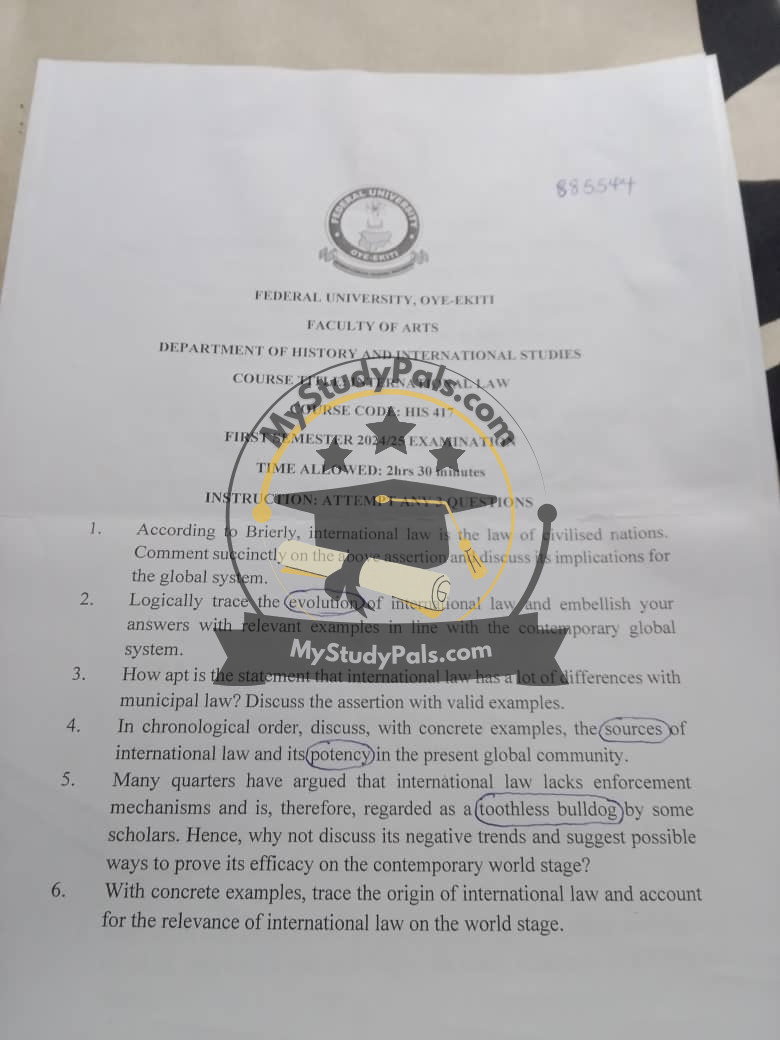ANSWER
Question 1:
According to Brierly, international law is the law of civilized nations. This assertion implies that international law governs the conduct of states in their interactions, promoting order, cooperation, and the resolution of disputes. The implication for the global system is that international law seeks to establish a framework for peaceful coexistence, preventing conflicts through treaties, conventions, and legal mechanisms. However, its effectiveness is sometimes questioned due to challenges in enforcement and compliance.
Question 2:
The evolution of international law can be traced through key historical milestones:
- Ancient and Classical Era – Early forms of international norms existed in Mesopotamia, Egypt, and Greece, including diplomatic protocols and treaties.
- Medieval Period – The influence of religious laws, such as canon law and Islamic legal traditions, contributed to the development of legal principles governing relations between states.
- The Treaty of Westphalia (1648) – Marked the emergence of the modern nation-state system, emphasizing sovereignty and non-interference.
- 19th and 20th Century Developments – The establishment of international organizations like the League of Nations and later the United Nations shaped international law, addressing war, diplomacy, and human rights.
- Contemporary Period – International law has expanded to include environmental law, human rights, trade agreements, and global governance institutions such as the International Criminal Court.
Question 3:
International law differs significantly from municipal (domestic) law:
- Sources of Law – Municipal law derives from national constitutions and legislation, while international law is based on treaties, customs, and legal principles.
- Enforcement – Municipal law is enforced by national authorities, whereas international law lacks a central enforcement body, relying on state cooperation and institutions like the UN or ICJ.
- Jurisdiction – Domestic laws apply to individuals within a state, while international law governs relations between sovereign states.
- Flexibility – International law is often more flexible, allowing for negotiations, while municipal law is rigid and backed by state authority.
Despite these differences, both legal systems interact and influence each other in various areas, such as human rights protection and trade regulations.
Question 4:
The sources of international law, in chronological order, include:
- Customary International Law – Derived from state practice over time, such as diplomatic immunity.
- Treaties and Conventions – Written agreements between states, such as the Geneva Conventions.
- General Principles of Law – Recognized by civilized nations, such as good faith and justice.
- Judicial Decisions and Scholarly Writings – Decisions from international courts and academic contributions help shape legal interpretations.
The potency of international law today is evident in areas like human rights enforcement, environmental protection, and dispute resolution through institutions like the UN and ICC. However, challenges such as state sovereignty and enforcement gaps remain.
Question 5:
The argument that international law lacks enforcement mechanisms has led to its characterization as a “toothless bulldog.” This criticism arises due to:
- Lack of Central Authority – Unlike domestic legal systems, there is no global police force.
- Selective Compliance – Powerful states may ignore rulings or withdraw from treaties.
- Challenges in Enforcement – Institutions like the ICJ rely on voluntary state cooperation.
To improve its efficacy, solutions include:
- Strengthening international courts and compliance mechanisms.
- Enhancing cooperation through economic and diplomatic incentives.
- Increasing accountability for violations through sanctions and collective action.
Question 6:
The origin of international law dates back to ancient civilizations, where treaties and norms governed interactions. Key historical moments include:
- Early Diplomatic Agreements (e.g., the Treaty of Kadesh between Egypt and the Hittites).
- The Westphalian System (1648) – Established the modern concept of sovereignty.
- The League of Nations (1919) and United Nations (1945) – Marked a shift towards institutionalized global governance.
The relevance of international law today is seen in areas such as:
- Human Rights Protection – Through treaties like the Universal Declaration of Human Rights.
- Peacekeeping and Security – Through UN interventions.
- Trade and Commerce – Regulated by institutions like the WTO.
International law remains essential in maintaining order, resolving disputes, and addressing global challenges.


